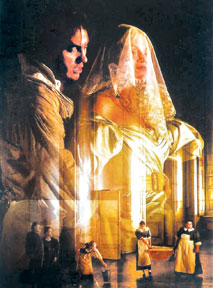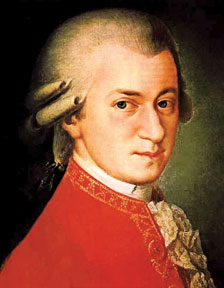The stunning and spectacular Le Nozze Di Figaro
by Gwen Herat
Just like his better part of music that is soft and gentle, so was
Wolfgang Amadeus Mozart whose celebrated masterpiece ‘Le Nozze Di
Figaro’ and better known as The Marriage of Figaro, laid bare its
spectacular genius on the stage of the Royal Opera House in London, a
few months ago.
The opera in four Acts, was first performed in 1786 and debuted at
the Royal Opera House in 2006 and presently, the revised version is
performed to all music lovers in London. It is supported by the ROH
Endowment Fund. Always a favourite with the audiences, it returns to the
ROH with increased fervour and produced by David McVicar who sets the
story in the late 1820s to reveal the truth and wit, the simmering
tension between master and servants.
 |
|
The count and countess
Alamviva from the opera. Le Nozze Di Figaro (the marriage of
Figaro) by Mozart |
 |
|
Mozart |
Therefore, the symptons of revolution are not far away. The
performance are world-class alternating in the roles, giving all the
experts to be a part of this great opera. The award winning Collin
Davies, a recognised Mozartian shares the baton with yet another great
conductor, David Syrus. Once again, Erwin Schrott takes over the role of
the cunning servant, Figaro.
This is enacted in such enlightened times that if the Count wishes to
dance, then Figaro will make sure it is to his tune and not his
master's. In the opera repertory, Mozart's music makes this one of the
finest crowns with a wealth of famous melodies all sung in Italian that
start from the familiar first notes of the energetic overture.
The arias include apart from sparkling overture and sung by: Non so
Piu – Cherubino, Non pius andrai’ – Figaro, Porgi Amor’ – Countess, Voi
che sapete’ – Cherubino, Dove sono’ – Countess,
Letter duet from Act.III) and Che soave zefiretto’ – Countess and
Susannah.
Infatuations
There is Cherubino's breathless infatuations in Non So Piu Cosa Son
and the prankish Figaro in Nov Piu Andrai’ as he is sent off to war but
there is also the genuine despair of the Countess at her husband's
infidelity, revealed lustrously in Porgi Amor, and Dove Sono. All shades
of emotion portrayed through the solos, duets and ensembles, bring a
Mozart masterpiece to full musical and dramatic life.
To understand a score in its historical context can be revealing the
way I felt though not much inclined to operatic works. The sound world
that musical textures a composer, reflects the age in which he lived. It
is very easy to identify Mozart in this spirit. By that revelation, the
significance of each of these arias can be identified, especially by
music scholars. Some composers are remembered today for a single work
and they top the charts each time a survey is made. My example on this
is the lesser known in Johann Pachelbel whose Canon in D is superior to
many of the compositions played in the concert Halls. Ask any composer
and he will agree with me.
Rewarding music
There are some good composers who have been forgotten for various
reasons and who wrote rewarding music. They may be few and probably no
undiscovered Beethovens or for that matter, Tchaikovskys. One reason is
that it at least takes half a century before a composer's music can be
properly evaluated or viewed in historical contest. But few are
exceptional like Mozart tonight and the list is endless.
Some of today's leading conductors go out of their way to bring in
the lesser known compositions under their baton. One such is the
principal director of the Royal Philharmonic Orchestra, Vladimir
Jurowski.
One has to admit that classical music is a minority; it is not every
one who dwell in it.; like me who struggles to ‘put up’ with operatic
music. And they are the ones who find an opera by Tchaikovsky to be the
most accessible of works who cannot understand and find difficult
challenge to ears more attuned to the melodies, harmonies and rhythms of
an opera by Puccini and Mozart, because this cannot be central to the
tastes of people who relish classical music in their own way and terms.
But for people with ordinary likes and dislikes who prefer to listen to
a wide variety of music are capable of being contradictory.
One cannot blame such people or their preferences. Yet, among them
are the ones who still can listen to classical music but abhor operatic.
This beautiful opera on the boards of the Royal Opera House, was a
fantastic musical experience I had. The whole scenario was glittering
with life, elevated by brilliant libretti and innate solos among duets
and others. Singing was so gorgeous that I felt it was the type of
operatic music that I did not expect. The independent intertwining
melodic parts related to each other, was easy on the ears.
New Music
For me it was like the cutting edge of new music because I rarely
listen to operatic music or watch an opera after running away from the
Phantom of the Opera few years back in London.
But what Mozart had created tonight was so gentle and awe inspiring.
It moved smoothly to the end mostly sung by the experienced classical
singers. I think they all excelled in their different roles, especially
Sussana (Eri Nakamura) and Figaro (Erwin Schrott) The movements to music
matched the voices and the costumes were brilliant in keeping with the
times.
Lighting effects created a mystery that highlighted some scenes which
otherwise would have looked drab and boring. The temperament with its
violent and rapid changes of mood and emotion was another highlight and
the excellent qualities or classical music was fully exploited. There
were no turmoil in Mozart's music, no neuroticism and no dark brooding
side. It rose in its direct conservative innocence and was wonderfully
uncomplicated.
Credits
Conductors: Colin Davis, David Syrus
Designs: Tanya Macallin
Lighting designs: Paule Constable
Movement Director: Leah Hausman
Cast
Figaro :Erwin Sccrott
Susanna: Eri Nakamura
Count Almaviva: Mariuz Kwiecian
Countess Almaviva: Annette Dasch
Cherubino: Christine Schafer
Bartolo: Robert Lioyd.
Bassilio: Peter Hoare
Don Curzio: Christopher Gillett
Marcelina: Mari McLaughlin
Barbarina: Amanda Forsyth
Antonio: Nicholas Folwell.
|



